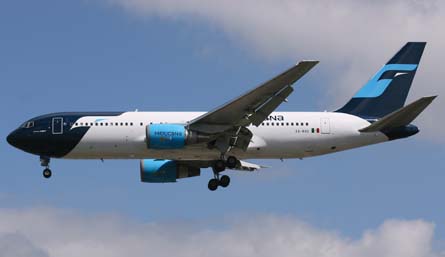Mexicana's woes create uncertainty for its independent frequent flyer scheme, showing the limits of frequent flyer spin-offs, writes Ravindra Bhagwanani at Global Flight
When Mexicana suspended ticket sales in early August, its sister company MexicanaLoyalty, which runs the airline's MexicanaGO FFP, was quick to reassure its members. On its website it boldly stressed its independence from the fate of Mexicana, although both were part of the Mexicana Group
|
|---|
© Dean Morley |
"Compañía Mexicana de Aviación is a very valued airline partner, but it is only one of close to 100 companies that offer GO points to reward loyalty in their products, and is only one of 18 airlines that provide rewards in exchange for those GO points.
"The standing and balance of GO points in a member's account is completely independent from the situation of CMA or of any individual MexicanaGO partner. The balance is the sole responsibility of MexicanaLoyalty with no relevance to the origin of those GO points," it says.
BACK TO WHERE IT ALL BEGAN |
|---|
In 1981 American Airlines spearheaded a new industry trend when it introduced the first frequent flyer programme, AAdvantage. Next February the Airline Business and Global Flight Loyalty Conference, the largest dedicated gathering of travel loyalty professionals, will take place where it all began: Confirmed speakers include Maya Leibman from American Airlines, Simon Hickey from Qantas, Ryan Green from Southwest Airlines and Jeffrey Low from Stash Hotel Rewards. Loyalty 2011 will focus on the industry’s current challenges. Book your place today to benefit from our exceptional agenda, networking opportunities, including prearranged one-to-one meetings, and low registration fees for airlines and non-air partners. The prestigious Loyalty Awards will also be celebrated at the event, where the three winners will have the chance to present their innovations to the crème de la crème of the industry. Nominations for innovations introduced in 2010 will open in November on the conference website. |
MexicanaGO's independent set-up aimed to prepare it for spin-off, like Air Canada's Aeroplan loyalty scheme. Aeroplan and airlines such as AeroMexico, Qantas, TAM and United, which are all more or less advanced on this track, claim an independent programme can be developed without any restraints. Investments are easier to realise, revenue streams from non-air partnerships are developed more aggressively and programmes are forced to adopt stringent liability management.
Mexicana had already achieved all these advantages, although Santiago Ontañón, Mexicana's executive vice-president loyalty and IT, believes one of the main issues was that the programme was only half way towards a full spin-off.
"If you think FFP separation from the airline is strategic, do it fast, not in a piecemeal fashion. And run the worst possible scenarios for the airline to see if you have truly achieved independence."
The issue that remains in every case is redemptions. Customers use FFPs because of the unique reward opportunities, such as free flights or upgrades. Without that, many non-air programmes would be more generous, or cashback formulas on credit cards could provide better value.
So while Aeroplan, for instance, is proud to claim that more miles are now accrued through financial partners than on Air Canada flights, most members still want to redeem their miles for flights. Non-air redemptions offer significantly lower value than flights - and they are not the reason why somebody chooses to be a FFP member.
PARENTAL SUPPORT
With most programmes having 80-90% of their membership in their home market, problems arise if the parent airline fails. With their handful of flights into Mexico, the remaining airline partners of MexicanaGO can never compensate for the network loss of Mexicana. And, if MexicanaGO resumed redemptions without Mexicana returning to the skies, it would struggle to satisfy reward demand.
Mexicana has demonstrated that frequent flyer spin-offs are a fair weather model, but the system itself is an obstacle to achieving practical independence from the parent airline.
The FFP depends on its (former) parent airline to provide the much-needed redemption capacity. Whether a programme is in-house or a spin-off does not make the slightest difference to that situation.
Spinning off an airline's FFP may generate a one-time financial gain, but this must be offset against the negatives of losing control over the programme and forgoing future revenue opportunities at the frequent flyer level. But the Mexicana case has clearly shown that the presumed advantage of guaranteeing the long-term survival of the programme through a spin-off is purely theoretical.
Ontañón estimates that Mexican's programme could have financially weathered at least 90 days of flight interruptions if it had been fully spun off.
That might seem a long time from a programme operator's perspective, but such estimations are unlikely to reassure investors looking into FFP spin-off models and seeking long-term perspectives for their investment.
Ravindra Bhagwanani is managing director at frequent flyer programme specialist Global Flight
Source: Airline Business
























